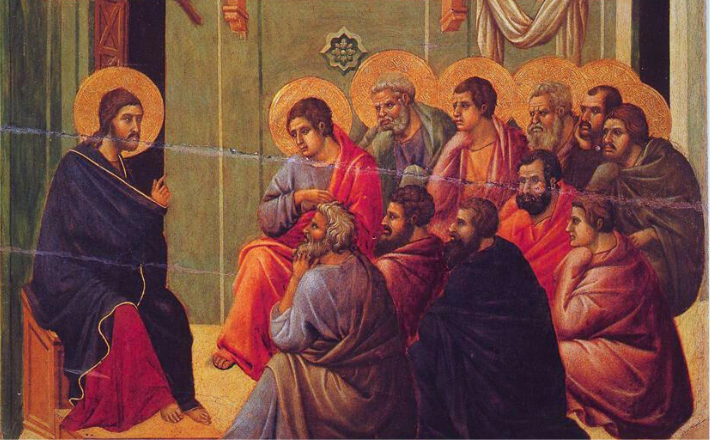Commentary on 1 John 5:9-13
John 5:9–13 presents one of the central tenets of Johannine theology, which is in turn also a central tenet of Christian theology at large: that there is an essential connection between belief in Jesus and possession of eternal life. In these verses, we find four terms prominently repeated: believe, Son, life, and testimony.
The passage begins with the last of these. In 1 John 5:9, John claims that divine testimony is greater than human testimony. While he will directly indicate what that divine testimony is in verse 11, there are hints earlier, beginning in verse 7. Here John states that there are “three that testify” and then in verse 8 provides the identities of the three: the spirit, the water, and the blood, which he notes are in fact one.
Human and divine testimony
The testimony of the three that are one in 1 John 5:8 is also the testimony of God mentioned in verse 9. These are not two different testimonies. Further, the conditional clause in verse 9a, “if we receive human testimony,” is not negated by the next clause in verse 9b, “the testimony of God is greater.” Because in Johannine literature, inclusive of the Gospel of John and 1–3 John, dualism features prominently and there is frequently a clash between what is of God and what is of the world, it is easy to read the first condition as something that ought not to be accepted. In this line of thinking it is as if John is saying, “Do not receive human testimony; receive the greater testimony of God!”
However, the grammar does not suggest this. It is what is called a “simple” conditional. In this specific form, the truth of the first clause is supposed in order to indicate that the second clause is also true by extension. “If this is so, then that is so.” If we receive the human testimony, all the more should we receive the testimony of God, which is greater than human testimony.
The prominence of testimony
There are eight different words related to “testimony” in 1 John 5:9–13, and 10 if the two preceding verses (in other words, 1 John 5:7–8) are included in the count. Both noun (“testimony”) and verb (“to testify”) forms appear, and they use the same Greek root, martyr, from which the English word “martyr” derives.
Both the noun and the verb appear throughout the New Testament, but are especially prominent in Johannine literature. Over half of the occurrences of both noun and verb in the New Testament are found either in the Gospel of John or in 1–3 John. The terms do not simply imply having an experience of or seeing a thing. Rather, they indicate attesting to the truth of a thing or offering testimony and, in some contexts, refer to testimony given in court proceedings.1
In this passage the term carries the sense of “affirmation” or “approval.” God the Father affirms the Son, and those who believe in the Son have that affirmation in their hearts (1 John 5:10). The prominence of “faith” or “belief” language in 1 John 5:10 is a natural corollary to the testimony language, insofar as one believes or disbelieves one’s testimony or affirmation. It is no surprise, then, that “belief” is another prominently Johannine word.
The content of the testimony
First John 5:11 directly states what the testimony is that God gave and that one ought to believe: “God gave us eternal life, and this life is in his Son.” The verse has strong parallels to John 3:16: “For God so loved the world that he gave his only Son, so that everyone who believes in him may not perish but may have eternal life.”
The constellation of God giving something, belief, and eternal life in God’s Son is distinctly Johannine. Possession of the Son by the individual believer is the mechanism by which eternal life is received. John indicates as much in 1 John 5:12: “Whoever has the Son has life; whoever does not have the Son of God does not have life.” For the author of 1 John, as for the author of the Gospel of John, there is a direct connection between life, the Son, and belief. Belief allows one to possess the Son, which in turn allows one to possess the life that is intrinsically bound to the Son.
Indeed, this is one of the very reasons John has written the letter, as he states in the passage’s final verse, 1 John 5:13. Yet again, possession of life eternal and belief in the Son of God are recapitulated, and John states the reason for which he has written “these things,” which refers to the letter in its entirety. This is the same reason Jesus’ deeds are written in the Gospel of John: so that we may believe and have life in Jesus’ name (John 20:31).
Notes
- Walter Bauer and William Arndt, A Greek-English Lexicon of the New Testament and Other Early Christian Literature, ed. Frederick W. Danker (Chicago: University of Chicago Press, 2000), s.v. μαρτύρεω; μαρτυρία, 617–19.


May 12, 2024